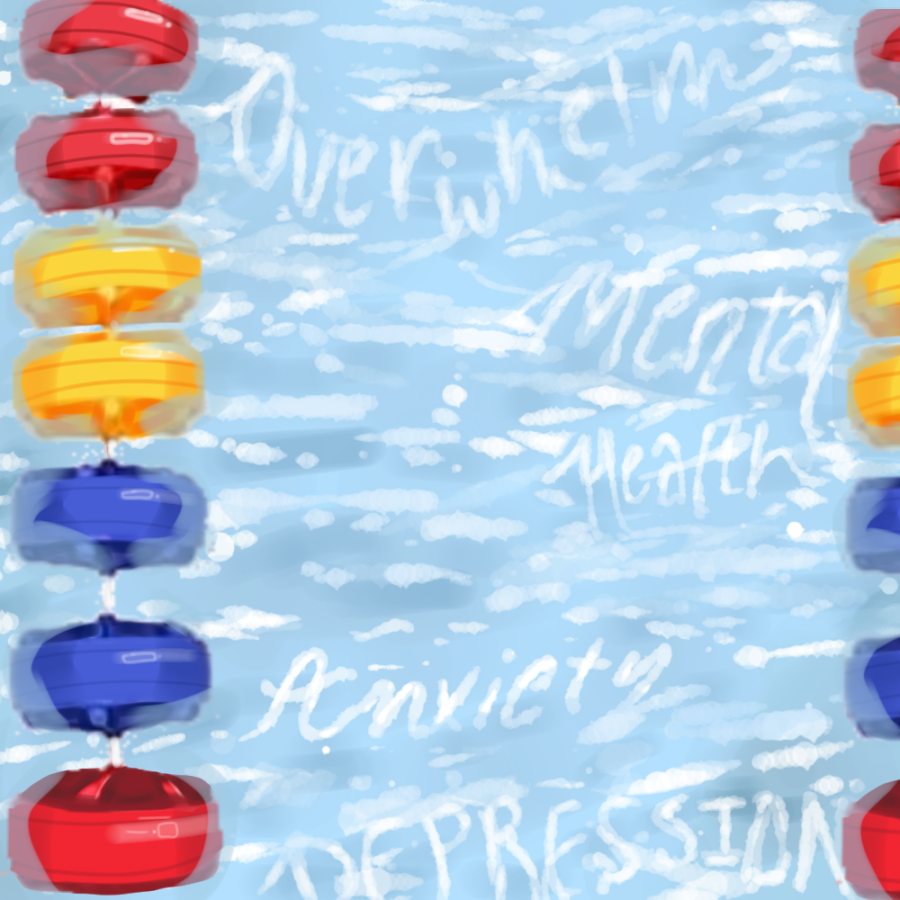Mental Health Joins the Starting Lineup
June 2, 2023
Sports have been the most consistent activity in my life. For almost twelve years, rain or shine, winter or summer, I was in a pool. I grew up with the competition, the rigor, the win-all, lose-all spirit. This was all I knew, until the world halted for COVID-19.
Suddenly, during the pandemic, I couldn’t even go to the market, let alone practice with a team. This constant in my life disappeared for almost two years. During this time, I became innately aware of the importance of mental health, as did the rest of society. I had to unlearn the mantra that mental health isn’t real health, which made me wonder how this inane mindset was ingrained in me. As I mapped out this inquiry, I found it all leading back to my history in sports.
Many of my coaches would cackle in my face if I told them that I wasn’t at practice because I was having a “bad mental health day.” Though I competed with multiple teams and met many new coaches, this restrictive mindset seemed to follow me wherever I went. While competing with one club, I found myself praying for injuries so that I would be allowed to take a break without consequences. I couldn’t vocalize the need for a mental pause or explain how debilitating the rigor of practice was for me; I had never been taught how to do so.
When I joined the Pali High Water Polo team, I experienced what it was like to be part of a team that valued mental health with coaches who prioritize the holistic well-being of their athletes. On this team, I never felt a pressure to neglect my mental health to show up for practice, contributing to my dedication to my team. The coaches cultivated a safe environment that allowed me to perform to the best of my ability.
Simone Biles, a gold medal-winning gymnast, brought significant attention to mental health in sports after her controversial decision to withdraw from the 2020 Tokyo Olympics mid-competition because of the toll it was taking on her mental health. While on an international stage, Biles fought against the stigma, the pressure and the oppressive mantras, standing up for herself while simultaneously paving the way for a new generation of athletes to do the same.
“Put mental health first, because if you don’t, then you’re not going to enjoy your sport, and you’re not going to succeed as much as you want to,” Biles told NBC News.
Coaches must adopt these new ideals in order to produce stronger, healthier and happier athletes. Many traditional coaches tend to think that respecting your emotional needs makes you “uncommitted” or “weak.” Every sport must advocate for competitors to place their mental health before the pressure and expectations of a team or spectators. The idea that poor physical health is the only valid justification for an absence from practice or competition is a dangerous ideology that could lead to injury and early retirement. Mental health is health, and mental fitness is directly related to your physical health. Coaches must advocate this reality to their players in order to restructure the high-pressure environment associated with many sports teams and clubs.
This accommodating atmosphere has not been present for some Pali athletes, including seniors Eva Khorsandi and Leah Khorsandi, both members of the Pali Swim and Dive team for four years and the Pali girls Water Polo team for two years.
On these teams, Leah Khorsandi said that she experienced a personal battle between the stigma associated with sports and her psychological well-being.
“I feel like in my personal experience, if I had wanted to take a leave for my mental health, it would make me feel like I’m giving up, or I’m just not trying hard enough,” she said.
“I think [sports] definitely put added pressure on combating mental health,” Eva Khorsandi added. “There’s the pressure of dealing with your mental health, but there’s also [the] pressure of performing well for the sport.”
Lily Hunt, a sophomore, said that she is also a victim of the stigma surrounding mental health. Hunt had played soccer for seven years due to the pressure to achieve, and she quit because of the mounting effects it had on her mental health.
“If [my coach] found out I was having trouble with mental health, I think they would have talked to my parents and then brushed it aside and not prioritized my spot as a player as much,” Hunt said.
“[The pressure] is another reason why people and myself don’t want to talk about it,” she added. “You feel like it’s going to jeopardize your playing time or your credibility as an athlete.”
Co-captain of the girls Water Polo team Taylor Gair, a junior, said that she “strongly believe[s] that sports do stigmatize mental health, but [she] can see it starting to change with the newer generation.”
“With sports, I don’t feel like I can really talk to my coaches about how I feel all the time, mainly because when I’m mentally drained, it shows weakness in a sport, especially like water polo where being tough and resilient is a staple,” she said.
Neglecting mental health in order to please a sports team is detrimental to the team environment and personal health. Coaches need to alter the competitive mindset in order to advocate for athletes to prioritize their emotional well-being. This change is important, and it starts with Pali.













